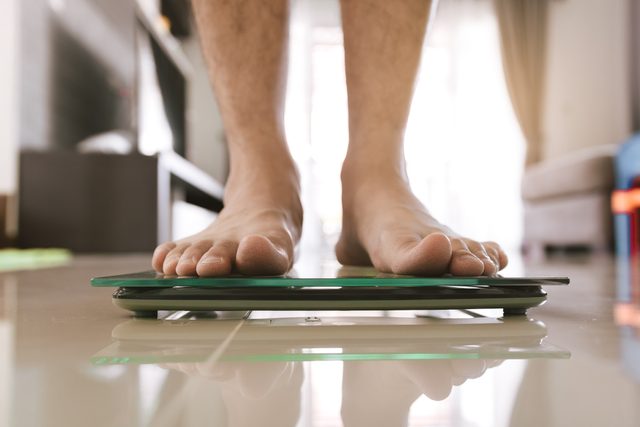
You’re not invincible
Millennials, born between approximately 1980 and 2000, probably believe their youth makes them one of the healthiest generations. (Not exactly: Colon cancer is hitting millennials hard.) “Part of normal development of this period involves feelings of invulnerability to bad consequences,” says Shivani Agarwal, MD, MPH, an assistant professor of medicine in the division of Endocrinology, Diabetes, and Metabolism in the Perelman School of Medicine at the University of Pennsylvania. “It’s often hard to live beyond the now, to try to visualize what bad outcomes could be prevented 10 years from now by doing the right things while still relatively healthy.”
Because of this, they may be apt to let their insurance lapse as they transition off their parents’ plan. According to the U.S. Census Bureau, the millennial generation, with 13.9 percent uninsured, are the least likely to be covered than any other age. But this lack of concern for their health can have a big impact later. “Regarding preventive care, millennials need to absolutely be aware of the fact that establishing healthy habits at this phase of their life will lead to longer term health as adults,” Dr. Agarwal says.

You’re at risk for obesity
One unforeseen problem may be a growing risk of obesity among younger adults. (Beware of food myths that could be making you gain weight.) “Obesity is a cause of concern in all age groups in the United States and globally, but especially in millennials,” Dr. Agarwal says. “Often, obesity which goes unchecked for years can lead to long-term changes in how the body processes food, maintains weight, and affects other organs of the body.”
Some of these changes are not reversible, she says, which is why awareness has to start early. Plus, a study published in Obesity Research & Clinical Practice found that a young person today has to eat better and exercise more to maintain the same weight as someone a generation ago, possibly due to environmental, lifestyle, and other yet-to-be-defined factors.

You may have a higher risk of stroke
Alongside the rise in obesity comes an increased risk of stroke for younger adults. (Here are the signs of a stroke.) A study published in JAMA Neurology found that the stroke risk for young men and women has been on the rise in the past 20 years, with the incidence almost doubling for men 18 to 34. The study authors say the increased chance of stroke coincides with a greater prevalence of risk factors, which are likely to blame.
“The younger age group had higher rates of untreated high blood pressure, obesity, diabetes, and also were more likely to be uninsured, which can lead to more poorly controlled risk factors for stroke,” Dr. Agarwal says. “Further study has to be undertaken to see if the increased stroke risk in the younger age group is a true finding, or simply isolated to this study.”

Sexually transmitted diseases aren’t going away
According to the Centers for Disease Control and Prevention (CDC), sexually transmitted diseases are on the rise, with chlamydia up 19 percent from 2014, gonorrhea up 63 percent, and syphilis up 71 percent—partly because of the reduction in STD programs (due to budget cuts) that treat and prevent the spread of the conditions. (Millennial men should be talking about these sexual health conditions, too.) Other factors may be an over-reliance on the HPV vaccine, which does prevent the HPV strains that could lead to cancer, but not other sexually transmitted infections. Also, today’s young adults didn’t witness the AIDS epidemic and are more likely to see HIV as a manageable disease. Because of this, sexually active young people are less likely to use protection—another CDC report shows a decrease in condom use over the past decade for young people.
But STIs are not to be taken lightly. For example, “chlamydia infections can lead to infertility if the infection is severe and untreated,” says Rebecca Beyda, MD, a pediatrician and an assistant professor in the Department of Pediatrics at McGovern Medical School at The University of Texas Health Science Center at Houston. “Condoms are the best way, besides not having sex, to prevent sexually transmitted infections. Everyone choosing to have sex should be tested at least once a year for sexually transmitted infections, as many lack signs or symptoms.”
Here’s why it’s time to revisit your birth control options.

Beware of binge drinking
Another reason younger people might skip condoms is the impaired judgment that comes with binge drinking and alcohol use disorder. (Here’s why you should watch your alcohol intake during the coronavirus pandemic.) “The leading cause of death for millennials is unintentional injuries, with motor vehicle collisions topping the list,” says Dr. Beyda. “Alcohol use and misuse often play a contributing role in these collisions.”
The National Institutes of Health reports that 1,825 college students die each year from alcohol-related injuries (although this statistic has been called into question), indicating binge drinking is still a problem on college campuses. (And disregard the quibbling over numbers—any death due to alcohol-impaired driving is one too many.) “If alcohol use begins to impact your performance at work or home, help and recovery resources are available,” Dr. Beyda says.

Tech can wear you down
Many health issues millennials face compared to baby boomers or Gen Xers stem from growing up with technology. (Find out ways technology could be making you sick.) First, spending too much time on a device leads to a sedentary lifestyle. “There is an established correlation between increased screen/TV/video game time and obesity,” Dr. Agarwal says. Plus, “we think that unrestricted technology usage can lead to lack of activity, social isolation, depression, higher intake of fatty foods, and therefore contribute to more weight gain.”
Working long hours sitting at a computer desk or playing video games can lead to bad posture and lack of movement. One survey from the U.K. found that more and more millennials are undergoing operations for conditions associated with inactive elderly people, like hemorrhoid removal and varicose veins. Staring down at a phone can also lead to “text neck,” which research shows could lead to spinal problems. Another study found that college students with high cell phone usage were more likely to have impaired hand function and thumb pain. Not all tech is bad, Dr. Agarwal points out: Health and fitness apps could actually have positive effects.
Check out the female celebrities who don’t drink alcohol.

Stress is wreaking havoc
According to the American Psychological Association’s Stress in America study, the millennial generation follows Gen X for the highest stress levels with at an average personal assessment of 5.7 on a scale of one to 10. (Healthy levels are considered four and under.) Money, work, and family responsibilities were cited as the main sources of stress. (Check out the stress “facts” to stop believing.)
Although younger adults have a reputation for being lazy, they are actually putting in long hours at work, creating job stress. Rates of depression and anxiety are also increasing among the younger generation, possibly because of increased societal pressures for perfection and the constant comparing over social media. “You can always talk to a health provider if you are having any symptoms of anxiety, depression, or even suicidal thoughts,” Dr. Beyda says. “Our mental health is an important part of our health.”

Vaping isn’t consequence-free
E-cigarettes may be a way to quit cigarettes, but they’ve taken on a life of their own among young people who don’t actually smoke. “Cigarette use among millennials is down compared to prior generations, but vaping is on the rise—both contain nicotine which is highly addictive,” Dr. Beyda says. According to research by the CDC, more than one in four high school students have tried an e-cigarette. Millennials are most likely to have tried vaping without ever having smoked. “While the long-term effects of vaping have yet to be seen, there are an increasing number of studies showing the chemicals used for vaping are harmful to your health,” Dr. Beyda says. (See more reasons you may want to stop vaping now.)

An unhealthy drive to be healthy?
The flip side of the millennial generation’s risk for obesity is an obsession with being “healthy,” which can have negative health outcomes of its own. Trendy “juicing” and “cleansing,” as well as dairy or gluten-free diets, may deprive younger adults of important nutrients. The U.K.’s National Osteoporosis Society said going dairy-free is a “ticking time bomb” for bone health due to the reduction in calcium. So if you’re going to avoid dairy, make sure you get calcium from elsewhere.
An eating disorder called “orthorexia nervosa” was even coined to describe this fixation on food. “When it comes to healthy eating, it’s about balance, not fear,” says New Jersey-based dietitian Erin Palinski-Wade, RD, CDE, author of Belly Fat Diet For Dummies. “If you start eliminating whole food groups or decide one particular nutrient or food is ‘bad’ or ‘dangerous,’ it can be a sign that your good intentions to improve health are taking a negative turn and headed on a path to disordered eating.”

Don’t delay or avoid care
Part of “adulting” is transitioning from a pediatrician to an adult doctor, and putting off the switch could leave young grownups vulnerable. “Young adulthood is a time of emerging independence, and establishing regular care with a primary care physician is part of that independence,” Dr. Beyda says. But, one survey found a whopping 93 percent of millennial adults not scheduling regular checkups. “Routine visits enable screening for medical issues, updates on vaccinations—tetanus, HPV, and the flu vaccine—and helps you get to know a provider in case of an illness,” Dr. Bedya says.
In addition, not going to the doctor when something is wrong can have major consequences down the line. “The millennial period is a time when disease control can worsen greatly, making it very hard to get back on track,” Dr. Agarwal says. “Getting expedited care for an acute problem is very important and should not be ignored so that short-term treatable problems don’t turn into chronic irreversible issues.”
Next, learn about why a billion millennials are at risk for a condition associated with dementia.
